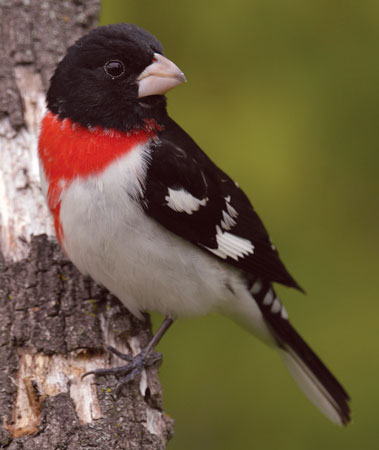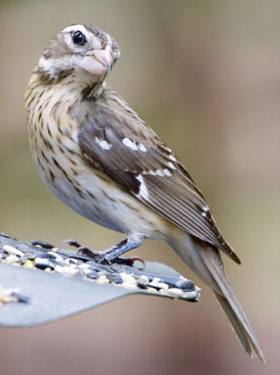Pheucticus ludovicianus
There are many reasons to enjoy backyard bird watching throughout the four seasons, not just in the winter months. And one of the best reasons is to not miss this magnificent spring and summer visitor. A medium to large finch, the Rose-breasted Grosbeak has a huge, white seed-eating bill. The male’s black and white dorsal markings and white underparts are set off by a brilliant red triangle on the breast. Seen in full sunlight, this color is breathtaking! The female is dramatically different in appearance, seeming to be an over-sized sparrow with streaked olive-brown and black above and a lighter streaked breast and flanks. The overall plumpness and relatively short tail are matches to her male counterpart, as is the massive bill. Her most distinguishing characteristic is a broad while supercilium (eyebrow).
The beauty does not end with the visual image. The Rose-breasted’s song is said to sound like a robin who has had voice lessons. Beautiful, rich, and melodious phrases are repeated, separated by pauses. This virtuoso performance comes from the male as he defines and defends his selected breeding territory, and invites a female to join him. Once a pair has established residency on your property listen for them to communicate with each other using a unique, metallic “chink” that sounds exactly like the squeak of a sneaker on a freshly polished gym floor.
Rose-breasted Grosbeaks are neotropical migrants. They winter in Mexico, Central America, and the Caribbean islands. Breeding range in the summer includes northeast and north central United States and much of Canada. What a treat for birdfeeders in this region when the first males return to the feeder each spring! During their stay in the north grosbeaks use a variety of habitats, including woodlands, shrubby edges, and suburban yards.
With half of their diet comprised of fruits and seeds, grosbeaks readily come to feeders. At your feeder their favorite foods are sunflower, safflower, and corn. Black striped sunflower with its large kernel and tough seed hull are by far their favorites. Aspen Song® Cardinal Mix is an ideal choice for this spectacular backyard visitor.
If your backyard habitat is selected by a pair of Rose-breasted Grosbeaks, and they visit your feeders regularly, expect the show to continue. Evidence suggests that this specie often returns year after year to the same site.
Reference
Wyatt, Valerie E. and Charles M. Francis. 2002. Rose-breasted Grosbeak (Pheucticus ludovicianus), The Birds of North America Online (A. Poole, Ed.). Ithaca: Cornell Lab of Ornithology.

